LAWYERS' Rights Watch Canada (LRWC) is a committee of lawyers who promote human rights and the rule of law through advocacy, education and research. LRWC is an NGO in Special Consultative Status with the Economic and Social Council (ECOSOC) of the United Nations (UN).
Introduction
In early May 2015, the world became aware that an entrenched international human rights crisis in Southeast Asia had become a humanitarian emergency, as human traffickers abruptly abandoned boatloads of migrants - men, women and children - from Myanmar and Bangladesh in the Andaman Sea. Thailand, Malaysia and Indonesia refused to allow the boats to land, leaving thousands stranded in life-threatening conditions.
The root causes of the crisis include failure by several States to abide by their international human rights obligations, lack of integrity of law enforcement officials and legal systems in several States, lack of commitment to international human rights standards by the member States of the Association of South East Asian Nations (Asean) and lack of consistent and firm insistence on implementation of human rights by other States with trading relationships in Southeast Asia.
LRWC urges all States in the region and their economic partners to create a regional plan of urgent action to push the Myanmar government to end its systematic persecution of Rohingya people from Myanmar and to implement international human rights law in their own States and trade agreements.
Overview of the current human rights and humanitarian crisis
Severe persecution of Rohingya people in Myanmar has led tens of thousands to flee Myanmar only to fall into the hands of human traffickers operating in several Southeast Asian countries.
On 1 May 2015 the human rights crisis became a regional humanitarian emergency after discovery of mass graves in south Thailand jungle camps where human traffickers were warehousing and ill-treating Rohingya people, depriving them of adequate food, water and shelter and reportedly subjecting them to beatings and torture.
The discovery provoked a crackdown by Thailand's military officials who arrested dozens of police and raided numerous recently-vacated jungle camps.
Thailand's crackdown methods aggravated the crisis, as traffickers responded by abandoning thousands of trafficked men, women and children off the coasts of Thailand, Malaysia and Indonesia in rickety, crowded boats without adequate food, water or shelter.
The crisis escalated as the three countries refused to allow the boats to land, leaving an estimated 7000 men, women and children stranded at sea.
Thailand called a regional meeting for 29 May 2015 to address the crisis. At a meeting of foreign ministers on 20 May, Thailand agreed to stop pushing back boats containing migrants, and Indonesia and Malaysia reversed their positions and agreed to temporarily shelter the migrants, provided they were resettled within a year with international assistance, and Myanmar reversed its initial refusal to attend the 29 May meeting.
As of 22 May, approximately 3500 migrants were estimated to remain stranded at sea. Myanmar officials deny persecuting Rohingya people and say that only proven Myanmar citizens will be allowed to return to Myanmar.
Further news reports on 25 May 2015 stated that at least 139 graves have been found in more than two dozen sites near the northern border of Malaysia. While identities of the dead have not been confirmed, it is believed that they are migrants from Myanmar and Bangladesh.
Roots of the crisis: Systematic violation of human rights and lack of integrity of legal systems
The source of the current crisis is found primarily in Myanmar's longstanding use of laws and policies to persecute Rohingya people.
In several countries in the region, inadequate enforcement of international human rights law and domestic laws have provided cover to trafficking networks that take migrant Rohingya from Myanmar, and nationals of other countries, such as Bangladesh, into Thailand as the first point of entry.
From there they are taken to Malaysia and other countries as undocumented migrant workers where many suffer abuse. Many of these migrants end up in slave-like situations in the seafood industry.
Corruption and lack of political will are key factors.
Myanmar's persecution of Rohingya people
Rohingya Muslims comprise from 735,000 to 1 million of Myanmar's 53 million people. Myanmar (Burma) has for many years failed to comply with its international human rights obligations with regard to the Rohingya population in North Rakhine State.
For years, persecution and privation of Rohingya in Rakhine State has left families considering that they have no choice but to attempt to migrate to other countries including Bangladesh, Thailand, Malaysia and Indonesia.
Human traffickers have been allowed to operate with impunity in Myanmar. Traffickers have even reportedly tricked or kidnapped Rohingya children as young as 13 years of age, later extorting ransoms from family members.
Myanmar's government has denied discriminating against Rohingya people, but civil society and UN officials have documented the following violations:
.. denial of citizenship to Rohingya people whose families have resided in Myanmar for many generations;
.. discriminatory restrictions on births to Rohingya people;
.. denial of the right of Rohingya to self-identify as such, refusing to recognise the Rohingya as one of Myanmar's national minorities and insisting that they be classified as ''Bengali,'' which term they consider a denial of their Rohingya heritage and language;
.. discriminatory restrictions on freedom of movement that severely impacts ''access to health care, food, water and sanitation, as well as education and livelihoods;''
.. unchecked hate speech that has accelerated particularly since 2012;
.. collective punishment of Muslims in Rakhine State;
.. attacks on humanitarian workers assisting Rohingya people in Rakhine State in 2014 and continued inadequate access for humanitarian aid in 2015;
.. threats against journalists for reporting violence against, or other persecution of Rohingya people and denial of access to Rakhine State by local and foreign journalists;
.. destruction of Rohingya Muslims' places of worship;
.. harassment including judicial harassment of human rights defenders advocating for human rights of Rohingya people;
.. and reprisals through imprisonment of Rohingya persons attempting to meet with the UN Special Rapporteur on the situation of human rights in Myanmar.
In his 2014 report, the UN Special Rapporteur on Myanmar on the situation of human rights in Myanmar, Tomas Ojea Quintana, stated that ''the pattern of widespread and systematic human rights violations in Rakhine State may constitute crimes against humanity as defined under the Rome Statute of the International Criminal Court.''
In the third week of May 2015, Myanmar's President U Thein Sein also brought into law the Population Control Health Care Bill passed by parliamentarians earlier in the month.
The law will require birth spacing by mothers in specific areas including Rakhine State. It is one of series of four laws widely perceived as targeting Muslim populations, and particularly Rohingya, in Myanmar.
Thailand: Official complicity in human trafficking networks
For years, Thailand has failed to address an entrenched pattern of human rights violations against refugees and migrants, including human trafficking, resulting in reduction of Thailand's ranking to the lowest Tier 3 ranking in a 2014 United States (US) Trafficking in Persons (TIP) report.
Thailand's governments, including the current military government, the National Council for Peace and Order (NCPO), in place since a coup on 22 May 2014, have failed to investigate and address allegations of human trafficking, including official complicity in trafficking networks.
Instead, successive governments have permitted the abuse of Thailand's criminal defamation laws to try to silence human rights workers and journalists [including Phuketwan's Chutima Sidasathian and Alan Morison] reporting such well-documented violations.
In 2013, it was reported that an unknown number of persons in detention were reportedly turned over by Thai officials to human traffickers who extracted money from the migrants.
In 2014, reports to the UN Committee against Torture indicated that Thailand's policies towards the Rohingya, as with other refugees and stateless people, have included deporting Rohingya back to Myanmar, pushing their boat back out to sea with inadequate supplies ''resulting in over 300 deaths in 2008-2009 alone''; or re-supplying their boats and ''helping them on'' towards their assumed final destinations (usually Malaysia or Indonesia).
Malaysia: Fails to implement laws to curtail human trafficking
In 2014, the US TIP Report downgraded Malaysia from its Tier 2 watch list to the lowest Tier 3 ranking because of Malaysia's failure to address human trafficking for successive years.
The porous border between Thailand and Malaysia allows traffickers to transport migrants from south Thailand into jungle camps in northern Malaysia and from there to crowded compounds in border towns or in Penang.
As in Thailand, traffickers extort ransoms from trafficking victims' families to secure victims' freedom. In March 2015, the UN Special Rapporteur on trafficking in persons, especially women and children, stated that Malaysia has in place the ''institutional and legal framework to prevent and combat trafficking'' but that the challenge is to make mechanisms ''more effective and able to deal with the ever changing features of trafficking, especially concerning its labor dimension, and its connection with migration policies.''
Recommendations
LRWC agrees with the recommendations of:
.. the Joint Statement by the UN High Commissioner for Refugees (UNHCR), the UN High Commissioner for Human Rights (UNHCHR), the International Organisation for Migration (IOM) and the Special Representative of the UN Secretary-General (SRSG) for International Migration and Development, ''Search and rescue at sea, disembarkation, and protection of the human rights of refugees and migrants now imperative to save lives in the Bay of Bengal and Andaman Sea;''
.. and, ASEAN Parliamentarians for Human Rights for ''a regional plan of action to push the Myanmar government to end its systematic persecution of over 1.3 million people.''
LRWC urges all ASEAN states to:
.. Uphold the Universal Declaration of Human Rights and their multilateral human rights treaty obligations;
.. Ratify the Refugee Convention of 1951 (which only Philippines and Cambodia have ratified);
Ratify all relevant core UN human rights treaties, In particular:
.. Myanmar should ratify the International Covenant on Civil and Political Rights (ICCPR),[39] International Covenant on Economic, Social and Cultural Rights (ICESCR), International Convention on the Elimination of All forms of Racial Discrimination (ICERD), Convention Against Torture and Other Cruel, Inhuman or Degrading Treatment or Punishment (CAT),[42] International Convention on the Protection of the Rights of All Migrant Workers and Members of Their Families (CMW), and the International Convention for the Protection of All Persons from Enforced Disappearance (CED);
.. Malaysia should ratify the ICCPR, ICESCR, ICERD, CAT, CMW, and the CED;
.. Thailand should ratify the CMW and the CED; and
.. Indonesia should ratify the CED.
.. Ensure adequate domestic legal frameworks to prevent, investigate and prosecute all those involved in human trafficking in accordance with international human rights standards; and
.. Ensure protection of the legitimate work of lawyers and human rights defenders, including human rights journalists, in conformity with the provisions of the UN Declaration on Human Rights Defenders,adopted by the General Assembly of the UN in 1999, especially Article 1, which states that ''everyone has the right, individually and in association with others, to promote and to strive for the protection and realisation of human rights and fundamental freedoms at the national and international levels,''
.. and Article 12.2, which provides that ''the State shall take all necessary measures to ensure the protection by the competent authorities of everyone, individually and in association with others, against any violence, threats, retaliation, de facto or de jure adverse discrimination, pressure or any other arbitrary action as a consequence of his or her legitimate exercise of the rights referred to in the present Declaration.''
Full Report http://goo.gl/QDnMQ5
REPORTERS ON THE RUN
Phuketwan journalists Alan Morison and Chutima Sidasathian will be in Bangkok for the Special Meeting on Irregular Migration in the Indian Ocean and available on the sidelines for interviews about the precedent-setting military versus media criminal defamation case brought against them by the Royal Thai Navy.
The criminal defamation and Computer Crimes Act case, with a seven-year jail term as a maximum penalty, centres on Phuketwan's word-for-word republication of a Pulitzer-Prize winning Reuters' paragraph that does not mention the Navy.
''As long as the Royal Thai Navy pursues these false charges, reporters and editors in Thailand and around the world cannot and will not accept the military government's word that it understands the universal principles of media freedom and democracy,'' says Morison.
Morison and Khun Chutima are obliged to begin serious preparations for their July trial from June 1. Please call Khun Chutima (''Oi'') on 089 4725117 to arrange an interview sometime between 2pm Thursday and noon Saturday.
WATCH How Trafficking Works
Phuketwan Investigative reporter Chutima Sidasathian, still being sued for criminal defamation over a Reuters paragraph: ''It's worse and worse, day by day. Nobody cares''.
http://journeyman.tv/67116/short-films/rohingya-hd.html
LISTEN The Rohingya Solution
A tragedy almost beyond words has been unfolding in Thailand, where a human smuggling network is thriving with the full knowledge of some corrupt law enforcement officers. Alan Morison of Phuketwan talks to Australia's AM program.
http://www.abc.net.au/am/content/2015/s4231108.htm
Introduction
In early May 2015, the world became aware that an entrenched international human rights crisis in Southeast Asia had become a humanitarian emergency, as human traffickers abruptly abandoned boatloads of migrants - men, women and children - from Myanmar and Bangladesh in the Andaman Sea. Thailand, Malaysia and Indonesia refused to allow the boats to land, leaving thousands stranded in life-threatening conditions.
The root causes of the crisis include failure by several States to abide by their international human rights obligations, lack of integrity of law enforcement officials and legal systems in several States, lack of commitment to international human rights standards by the member States of the Association of South East Asian Nations (Asean) and lack of consistent and firm insistence on implementation of human rights by other States with trading relationships in Southeast Asia.
LRWC urges all States in the region and their economic partners to create a regional plan of urgent action to push the Myanmar government to end its systematic persecution of Rohingya people from Myanmar and to implement international human rights law in their own States and trade agreements.
Overview of the current human rights and humanitarian crisis
Severe persecution of Rohingya people in Myanmar has led tens of thousands to flee Myanmar only to fall into the hands of human traffickers operating in several Southeast Asian countries.
On 1 May 2015 the human rights crisis became a regional humanitarian emergency after discovery of mass graves in south Thailand jungle camps where human traffickers were warehousing and ill-treating Rohingya people, depriving them of adequate food, water and shelter and reportedly subjecting them to beatings and torture.
The discovery provoked a crackdown by Thailand's military officials who arrested dozens of police and raided numerous recently-vacated jungle camps.
Thailand's crackdown methods aggravated the crisis, as traffickers responded by abandoning thousands of trafficked men, women and children off the coasts of Thailand, Malaysia and Indonesia in rickety, crowded boats without adequate food, water or shelter.
The crisis escalated as the three countries refused to allow the boats to land, leaving an estimated 7000 men, women and children stranded at sea.
Thailand called a regional meeting for 29 May 2015 to address the crisis. At a meeting of foreign ministers on 20 May, Thailand agreed to stop pushing back boats containing migrants, and Indonesia and Malaysia reversed their positions and agreed to temporarily shelter the migrants, provided they were resettled within a year with international assistance, and Myanmar reversed its initial refusal to attend the 29 May meeting.
As of 22 May, approximately 3500 migrants were estimated to remain stranded at sea. Myanmar officials deny persecuting Rohingya people and say that only proven Myanmar citizens will be allowed to return to Myanmar.
Further news reports on 25 May 2015 stated that at least 139 graves have been found in more than two dozen sites near the northern border of Malaysia. While identities of the dead have not been confirmed, it is believed that they are migrants from Myanmar and Bangladesh.
Roots of the crisis: Systematic violation of human rights and lack of integrity of legal systems
The source of the current crisis is found primarily in Myanmar's longstanding use of laws and policies to persecute Rohingya people.
In several countries in the region, inadequate enforcement of international human rights law and domestic laws have provided cover to trafficking networks that take migrant Rohingya from Myanmar, and nationals of other countries, such as Bangladesh, into Thailand as the first point of entry.
From there they are taken to Malaysia and other countries as undocumented migrant workers where many suffer abuse. Many of these migrants end up in slave-like situations in the seafood industry.
Corruption and lack of political will are key factors.
Myanmar's persecution of Rohingya people
Rohingya Muslims comprise from 735,000 to 1 million of Myanmar's 53 million people. Myanmar (Burma) has for many years failed to comply with its international human rights obligations with regard to the Rohingya population in North Rakhine State.
For years, persecution and privation of Rohingya in Rakhine State has left families considering that they have no choice but to attempt to migrate to other countries including Bangladesh, Thailand, Malaysia and Indonesia.
Human traffickers have been allowed to operate with impunity in Myanmar. Traffickers have even reportedly tricked or kidnapped Rohingya children as young as 13 years of age, later extorting ransoms from family members.
Myanmar's government has denied discriminating against Rohingya people, but civil society and UN officials have documented the following violations:
.. denial of citizenship to Rohingya people whose families have resided in Myanmar for many generations;
.. discriminatory restrictions on births to Rohingya people;
.. denial of the right of Rohingya to self-identify as such, refusing to recognise the Rohingya as one of Myanmar's national minorities and insisting that they be classified as ''Bengali,'' which term they consider a denial of their Rohingya heritage and language;
.. discriminatory restrictions on freedom of movement that severely impacts ''access to health care, food, water and sanitation, as well as education and livelihoods;''
.. unchecked hate speech that has accelerated particularly since 2012;
.. collective punishment of Muslims in Rakhine State;
.. attacks on humanitarian workers assisting Rohingya people in Rakhine State in 2014 and continued inadequate access for humanitarian aid in 2015;
.. threats against journalists for reporting violence against, or other persecution of Rohingya people and denial of access to Rakhine State by local and foreign journalists;
.. destruction of Rohingya Muslims' places of worship;
.. harassment including judicial harassment of human rights defenders advocating for human rights of Rohingya people;
.. and reprisals through imprisonment of Rohingya persons attempting to meet with the UN Special Rapporteur on the situation of human rights in Myanmar.
In his 2014 report, the UN Special Rapporteur on Myanmar on the situation of human rights in Myanmar, Tomas Ojea Quintana, stated that ''the pattern of widespread and systematic human rights violations in Rakhine State may constitute crimes against humanity as defined under the Rome Statute of the International Criminal Court.''
In the third week of May 2015, Myanmar's President U Thein Sein also brought into law the Population Control Health Care Bill passed by parliamentarians earlier in the month.
The law will require birth spacing by mothers in specific areas including Rakhine State. It is one of series of four laws widely perceived as targeting Muslim populations, and particularly Rohingya, in Myanmar.
Thailand: Official complicity in human trafficking networks
For years, Thailand has failed to address an entrenched pattern of human rights violations against refugees and migrants, including human trafficking, resulting in reduction of Thailand's ranking to the lowest Tier 3 ranking in a 2014 United States (US) Trafficking in Persons (TIP) report.
Thailand's governments, including the current military government, the National Council for Peace and Order (NCPO), in place since a coup on 22 May 2014, have failed to investigate and address allegations of human trafficking, including official complicity in trafficking networks.
Instead, successive governments have permitted the abuse of Thailand's criminal defamation laws to try to silence human rights workers and journalists [including Phuketwan's Chutima Sidasathian and Alan Morison] reporting such well-documented violations.
In 2013, it was reported that an unknown number of persons in detention were reportedly turned over by Thai officials to human traffickers who extracted money from the migrants.
In 2014, reports to the UN Committee against Torture indicated that Thailand's policies towards the Rohingya, as with other refugees and stateless people, have included deporting Rohingya back to Myanmar, pushing their boat back out to sea with inadequate supplies ''resulting in over 300 deaths in 2008-2009 alone''; or re-supplying their boats and ''helping them on'' towards their assumed final destinations (usually Malaysia or Indonesia).
Malaysia: Fails to implement laws to curtail human trafficking
In 2014, the US TIP Report downgraded Malaysia from its Tier 2 watch list to the lowest Tier 3 ranking because of Malaysia's failure to address human trafficking for successive years.
The porous border between Thailand and Malaysia allows traffickers to transport migrants from south Thailand into jungle camps in northern Malaysia and from there to crowded compounds in border towns or in Penang.
As in Thailand, traffickers extort ransoms from trafficking victims' families to secure victims' freedom. In March 2015, the UN Special Rapporteur on trafficking in persons, especially women and children, stated that Malaysia has in place the ''institutional and legal framework to prevent and combat trafficking'' but that the challenge is to make mechanisms ''more effective and able to deal with the ever changing features of trafficking, especially concerning its labor dimension, and its connection with migration policies.''
Recommendations
LRWC agrees with the recommendations of:
.. the Joint Statement by the UN High Commissioner for Refugees (UNHCR), the UN High Commissioner for Human Rights (UNHCHR), the International Organisation for Migration (IOM) and the Special Representative of the UN Secretary-General (SRSG) for International Migration and Development, ''Search and rescue at sea, disembarkation, and protection of the human rights of refugees and migrants now imperative to save lives in the Bay of Bengal and Andaman Sea;''
.. and, ASEAN Parliamentarians for Human Rights for ''a regional plan of action to push the Myanmar government to end its systematic persecution of over 1.3 million people.''
LRWC urges all ASEAN states to:
.. Uphold the Universal Declaration of Human Rights and their multilateral human rights treaty obligations;
.. Ratify the Refugee Convention of 1951 (which only Philippines and Cambodia have ratified);
Ratify all relevant core UN human rights treaties, In particular:
.. Myanmar should ratify the International Covenant on Civil and Political Rights (ICCPR),[39] International Covenant on Economic, Social and Cultural Rights (ICESCR), International Convention on the Elimination of All forms of Racial Discrimination (ICERD), Convention Against Torture and Other Cruel, Inhuman or Degrading Treatment or Punishment (CAT),[42] International Convention on the Protection of the Rights of All Migrant Workers and Members of Their Families (CMW), and the International Convention for the Protection of All Persons from Enforced Disappearance (CED);
.. Malaysia should ratify the ICCPR, ICESCR, ICERD, CAT, CMW, and the CED;
.. Thailand should ratify the CMW and the CED; and
.. Indonesia should ratify the CED.
.. Ensure adequate domestic legal frameworks to prevent, investigate and prosecute all those involved in human trafficking in accordance with international human rights standards; and
.. Ensure protection of the legitimate work of lawyers and human rights defenders, including human rights journalists, in conformity with the provisions of the UN Declaration on Human Rights Defenders,adopted by the General Assembly of the UN in 1999, especially Article 1, which states that ''everyone has the right, individually and in association with others, to promote and to strive for the protection and realisation of human rights and fundamental freedoms at the national and international levels,''
.. and Article 12.2, which provides that ''the State shall take all necessary measures to ensure the protection by the competent authorities of everyone, individually and in association with others, against any violence, threats, retaliation, de facto or de jure adverse discrimination, pressure or any other arbitrary action as a consequence of his or her legitimate exercise of the rights referred to in the present Declaration.''
Full Report http://goo.gl/QDnMQ5
REPORTERS ON THE RUN
Phuketwan journalists Alan Morison and Chutima Sidasathian will be in Bangkok for the Special Meeting on Irregular Migration in the Indian Ocean and available on the sidelines for interviews about the precedent-setting military versus media criminal defamation case brought against them by the Royal Thai Navy.
The criminal defamation and Computer Crimes Act case, with a seven-year jail term as a maximum penalty, centres on Phuketwan's word-for-word republication of a Pulitzer-Prize winning Reuters' paragraph that does not mention the Navy.
''As long as the Royal Thai Navy pursues these false charges, reporters and editors in Thailand and around the world cannot and will not accept the military government's word that it understands the universal principles of media freedom and democracy,'' says Morison.
Morison and Khun Chutima are obliged to begin serious preparations for their July trial from June 1. Please call Khun Chutima (''Oi'') on 089 4725117 to arrange an interview sometime between 2pm Thursday and noon Saturday.
WATCH How Trafficking Works
Phuketwan Investigative reporter Chutima Sidasathian, still being sued for criminal defamation over a Reuters paragraph: ''It's worse and worse, day by day. Nobody cares''.
http://journeyman.tv/67116/short-films/rohingya-hd.html
LISTEN The Rohingya Solution
A tragedy almost beyond words has been unfolding in Thailand, where a human smuggling network is thriving with the full knowledge of some corrupt law enforcement officers. Alan Morison of Phuketwan talks to Australia's AM program.
http://www.abc.net.au/am/content/2015/s4231108.htm

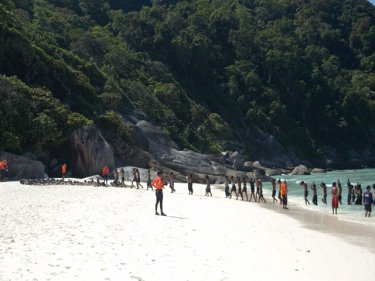
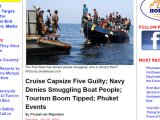
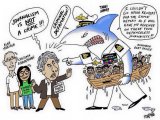

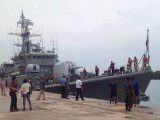


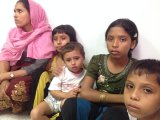

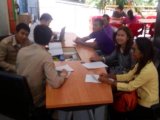



Dear Ed
I am glad that no one in my immediate family has been burnt to death by Buddhist mobs.
I am grateful that no one in my immediate family has been beaten to death by Buddhist mobs or Buddhist monks.
I am relieved that no one in my immediate family is on the receiving end of hate speech by the Burmese Buddhist monk, Wirathu.
However, the Rohingya victims are part of my extended family and they are part of everyone's extended family.
The article from Lawyers' Rights Watch Canada is intelligent, articulate, educated and compassionate. The hate speech from the monk Wirathu is merely semi-articulate and good fodder for only his easily brain-washed followers.
Buddhist mob attacks:
https://www.youtube.com/watch?v=7npcj-fuP-c
Ian Yarwood
Solicitor - Perth, Western Australia
Posted by Ian Yarwood on May 28, 2015 15:15